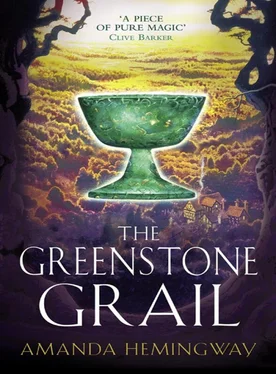1 ...8 9 10 12 13 14 ...20 He didn’t like the dream now, for all the exhilaration of the flight. He felt as if merely by watching, by being there, he had become a part of it, a mute participant in some terrible misdeed. He tried to pull himself away from the phalanx, and found his thought was falling, dropping like a stone towards the sea. And then his dive slowed to a glide, brushing the wave-crests, just above the place where the ship had gone down. There was someone in the water, presumably the last of the crew: he saw the grey hood bobbing up and down. The person had no lifebelt, no inflatable jacket; he wouldn’t last long. The xaurian riders, knowing that, had left him to his fate. Even though the drowning man had no visible face Nathan felt his terror, and the need to help grew inside him, strong as rage, until he thought he would burst with it. He drifted lower, reaching out, feeling the slap of cold water on his skin, seizing the flailing hands with a grip that caught and held. Then they were jerked out of the dream with a violence that made Nathan’s stomach turn, landing painfully on a beach of stones. A beach at night, with breakers crumbling on the shingle, and upflung sheets of foam, luminous in the darkness. Nathan released the clasping hands and sensed himself withdrawing, sliding backwards into oblivion. The dormitory bell roused him, hours or minutes later. He sat up, conscious of discomfort, and found the sleeves of his pyjamas were damp.
That Saturday there was a rugby match against another school. Nathan scored two tries, helping the Ffylde Abbey team to victory, and went home late and on a high. He had been planning to tell Bartlemy about the dreams but somehow, when it came to it, he distrusted his own imagination, and was not yet ready to expose himself to anyone’s disbelief. But on Sunday he could see Hazel, and confiding in her was second nature to him. (Not George, he decided, without asking himself why. Just Hazel.) In the morning, he and Annie sat over a late breakfast, listening to the local news on the radio. A projected housing development, a missing person, the risk of flooding in the area. ‘A man discovered three days ago on the beach at Pevensey Bay is believed to be an illegal immigrant. He was dressed in waterproof clothing which covered him from head to foot, suggesting he may have swum in from a boat. He speaks no English and so far his nationality has not been established. Police think it unlikely he was alone and are asking local residents to be on the lookout.’
Annie noticed Nathan had stopped eating his cornflakes. ‘Are you all right?’ she inquired.
‘Yes. Yes, of course.’ He resumed his breakfast, but with less enthusiasm. After a minute, he asked: ‘What will they do with him? Will they – will they put him in prison?’
‘The illegal immigrant? I suppose so. Until they work out who he is, and whether to grant him asylum.’
‘But … that’s wrong. He’s alone. He’s desperate. We should help him.’
Annie was touched by his concern. ‘Yes, we should,’ she said. ‘The trouble is, people are afraid. They’re afraid of strangers, of anybody different. They think immigrants will take their jobs or their homes, even though there aren’t that many of them, and newcomers create jobs as well as doing them. But fear makes people stupid, and sometimes cruel.’
‘Could I go and see him?’ Nathan demanded abruptly. ‘The man on the beach?’
Annie looked astonished. ‘I don’t think so,’ she said. ‘They wouldn’t let you. Maybe you could write.’
‘Yes, but … he doesn’t speak English,’ Nathan reminded her. He gave up on breakfast altogether, and asked to leave the table. He wanted space to think.
‘It’s impossible,’ Hazel said that afternoon, in the Den, but she didn’t sound sure.
‘There are meant to be lots of other universes,’ Nathan said. ‘That isn’t just in books; Father Clement told us about it, in physics. There are millions of them, some like ours, some different. It’s called the multiverse. Supposing, in my dream, I was actually in one of them, and somehow I pulled that man out, back into ours?’
‘That’s ridiculous,’ Hazel said, curiously daunted. When they were much younger, the two of them had spent a lot of time exploring wardrobes in the hope of making their way into other worlds; but she had outgrown such fancies now. Or so she told herself, part wistful, part scornful, strangely afraid. She knew Nathan would never lie to her.
‘You’re talking about magic ,’ she said at last. She had no opinion of physics.
‘Maybe.’ Nathan was pensive. ‘What is magic, anyway? According to someone or other, it’s just science we don’t understand.’
‘How do we find out more?’
‘I don’t know. I could ask Uncle Barty: he knows about lots of things. History, and archaeology, and all the sciences. Besides, Mum says his cooking is definitely magical.’
Hazel made a snorting noise. ‘Cooking isn’t magic,’ she said. ‘Even if that chocolate cake for your last birthday was amazing … Are there books on it? Magic, not cookery.’
Nathan nodded. ‘They’re called grimoires. Mum had some in once. I thought they would be interesting, but they were awfully dull, just about drawing runes and symbols, and picking herbs at the full moon, and boring rituals for calling up demons. There weren’t even any sacrifices, let alone stuff about other worlds. They wouldn’t be any good to us.’ There was a long silence, filled with frustrated thought. ‘What we need,’ said Nathan, ‘is a witch. Witches were burnt here, hundreds of years ago, in that open space outside the church. Uncle Barty told me about it. I asked him if they were real witches, and he said mostly not – but “mostly” isn’t all. I read the names: some of them were Carlows, like your great-grandmother. Was she born a Carlow, or did she marry one?’
‘Both, I think,’ Hazel said, frowning. ‘Dad’s always telling Mum her family are inbred. He said Great-grandma was barmy, and she married her own cousin, which is supposed to make your children mad or sub or something … He says she’s a witch, too, but I expect that’s just an insult.’
‘We could go and ask her,’ Nathan suggested tentatively. ‘She wouldn’t mind us asking – would she? It isn’t as if witches get burnt nowadays.’
‘She’ll mind,’ Hazel said with conviction. ‘She’s … well, you know.’
Nathan did know. Effie Carlow’s acid tongue and eagle stare did not encourage idle questions. However …
‘If we can’t think of anyone else,’ he said, ‘we’ll have to ask her. We must ask someone .’
Back at school, he tried to listen to the news on the Common Room radio as much as possible, but there was nothing further about the man on the beach. He sounded out Father Clement on alternative universes, but the monk said that to his knowledge nobody had ever visited one, though he assumed it would be feasible. In theory. By Friday night when his mother took him home to Eade, Nathan had made up his mind. On Saturday George came round, so it was not until Sunday that he told Hazel: ‘We have to go and see your great-grandmother. There isn’t anyone else.’
Effie Carlow lived in a cottage on the Chizzledown road about half a mile outside Eade. Built in the Victorian era, weathering had mellowed its façade and climbing plants had overgrown its more commonplace features, rendering it attractive if not picturesque. Too small to be of interest to buyers from London, it had diminutive windows admitting little light into poky rooms and a roof that sagged almost to ground level, while at the rear there was an outhouse which Effie rented to a local artist as a studio. The walled garden was a miniature wilderness in which weeds and wild flowers predominated. ‘We ought to telephone her first,’ Nathan had said before they set out.
Читать дальше












